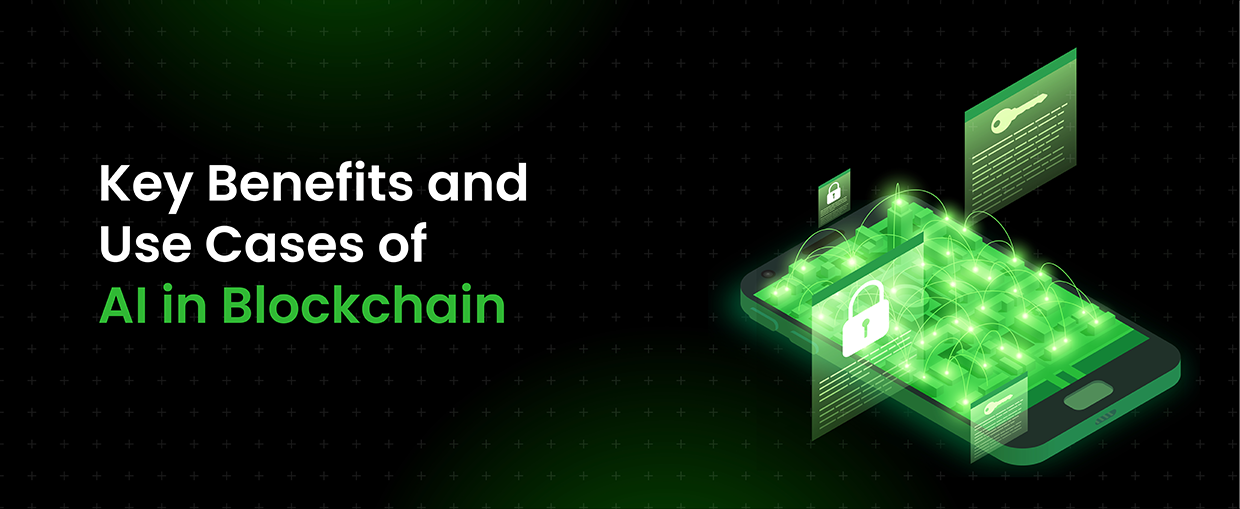AI and blockchain are two of the most disruptive modern-day technologies. While both of these innovations have had a significant impact on their own, the integration of AI and Blockchain has the potential to transform businesses across the board, offering up new opportunities in areas such as supply chain, logistics, cybersecurity, and beyond.
AI allows machines to make decisions and assist humans, whereas blockchain offers a safe and transparent distributed ledger. When we talk about AI in blockchain, we mean integrating AI algorithms and techniques into blockchain technology. This integration offers vast potential – enabling blockchain systems to evolve into more sophisticated, effective, and independent entities capable of managing complex tasks. The seamless integration of AI with Blockchain is expected to spark a surge of innovation, transforming problem-solving and decision-making methods.
Let’s take a closer look at AI in blockchain, its benefits, use cases, and more!
Introduction to AI and Blockchain
AI, in simple terms, refers to a machine’s ability to replicate human intelligence. It entails building algorithms and models that allow computers to execute tasks that would ordinarily require human intelligence. These tasks cover many different areas, ranging from natural language processing and image recognition to more complicated decision-making processes.
Blockchain is a distributed and immutable digital ledger technology. Blockchain development rose to popularity as the foundational technology for cryptocurrencies such as Bitcoin. A blockchain is made up of a chain of blocks, each carrying a record of transactions. What defines it is its distributed nature, which ensures that no single entity retains authority, making it highly secure and tamper-resistant. Transactions on a blockchain are also visible and traceable, which builds trust among participants.
Benefits of AI in Blockchain
1. Better Data Management
AI can evaluate patterns and help improve the hashing process, hence expediting data management. AI can use machine learning models to estimate the most successful hash combinations based on past data and present network conditions.
2. Improved Scalability
By anticipating and controlling network loads, AI can help blockchains in becoming scalable without sacrificing their security or decentralization, allowing for modifications that maximize network efficiency. By predicting future network demands, AI’s predictive skills can also help prioritize resource allocation.
3. Transaction Efficiency
AI algorithms can improve how transactions are executed on the blockchain by predicting peak times and splitting the load more equally, minimizing bottlenecks and assuring speedier transactions. AI can potentially improve the efficiency of smart contract execution by anticipating future problems and optimizing contract code.
4. Energy Consumption Optimization
Artificial Intelligence in Blockchain optimizes operations by improving the data mining process, which saves time and effort. As a result of this optimization, the Blockchain ecosystem consumes energy more efficiently.
5. Heightened Security
Despite being known for having robust security, blockchain-based applications are not resilient to flaws. By integrating AI, Blockchain’s peer-to-peer linking is enhanced with real-time data transformation, image recognition, and natural language processing (NLP) capabilities.
Use Cases of AI in Blockchain
Blockchain Security
The enhancement of security measures is one of the biggest benefits of integrating AI with Blockchain. Blockchains have traditionally utilized encryption to secure and validate transactions. AI can, however, provide an additional degree of security by monitoring all blockchain transactions and network activity, identifying any anomalies instantly, and initiating preventive measures.
Smart Contracts
AI can increase the efficiency of smart contracts by evaluating past data and applying predictive analytics to predict any challenges in carrying out contract conditions. By using natural language processing, smart contracts can interpret and manage human legal contracts. Additionally, AI can also optimize smart contracts for scalability, making sure that performance remains stable even as the volume of transactions increases. This is essential for Blockchain networks with high traffic.
Supply Chain
AI examines data from sensors and IoT devices to find patterns, spot irregularities, and streamline supply chains. Blockchain guarantees safe, immutable monitoring of each transaction, confirming the legitimacy of goods from point of origin to point of destination. Blockchain and AI work together to improve supply chain efficiency, transparency, and fraud prevention.
Predictive Analytics
Predictive analytics in blockchain uses AI to foresee trends and behaviors. AI forecasts supply chain interruptions to optimize operations, identifies fraud in real time, and forecasts consumer behavior on blockchain platforms. Businesses can obtain important insights for market decisions, logistics, security, and personalized customer service by integrating the predicting capabilities of AI with the transparency of blockchain technology.
Asset Tokenization
While real-world assets like stocks and artwork can be tokenized using blockchain technology, the value of each token can be determined by using AI to examine provenance data, asset conditions, and trends in the market. Additionally, machine learning has the ability to continuously update the tokenized value of an asset by analyzing real-time data sources.
Industries That Benefit from AI and Blockchain Integration
Healthcare
AI has the potential to improve nearly every aspect of healthcare, from recognizing patterns in patient data to generating proposed treatments and meeting user requirements. Companies can further enhance care and preserve patient privacy by using blockchain technology to store patient data, including electronic health records.
Supply Chain
Blockchain technology integrated with AI can revolutionize supply chain management. Businesses can examine past data and forecast demand trends with AI algorithms by combining smart contracts and predictive analytics. Through smart contracts, the Blockchain can then autonomously order supplies, optimize distribution, and adjust inventory levels.
Financial Services
By fostering trust, reducing friction in multiparty transactions, and speeding up transactions, blockchain and artificial intelligence are revolutionizing the financial services sector. AI can assist in improving automation and performance levels, while blockchain will foster greater trust in the industry through smart contracts.
Life Sciences
Blockchain and artificial intelligence in the pharmaceutical sector can improve drug supply chain visibility and traceability. Automation of trial participation and data collecting, data integrity, transparency, patient tracking, and consent management are made possible by combining sophisticated data analysis with a decentralized framework for clinical trials.
The Wrap
To sum up, the intersection of blockchain and artificial intelligence is a cutting-edge area of innovation with enormous potential to revolutionize multiple industries and bring about profound transformations. You can quickly and effortlessly leverage the power of AI in blockchain by partnering with an experienced and reliable AI and blockchain development company that offers top-tier blockchain development services.




One Response
The multiplayer features discussion could expand with cooperative modes analysis.